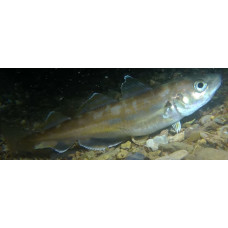Latin name
Merlangius merlangus
Other names
Whiting, Merling (English), Medzhid (Bulgarian), Wijting (Dutch), Ταούκι (Tauki) (Greek), Merlan (Hebrew), Plegonero (Spanish), Merlano (Italian), Wittling (German), Witlinek (Polish), Badejo (Portuguese), Bacaliar (Romanian), Pišmolj, Velika ugotica (Serbian, Croatian), Mol (Slovenian), Bakalyaro balığı (Turkish), Merlan (French), Treska bezvousá (Czech).
Identification
It has three dorsal fins separated by small slits. The third fin extends almost to the caudal fin. The caudal fin is truncated. The two anal fins are close together. The pectoral fin is also quite long. The upper jaw is slightly larger than the lower. The lateral line runs the length of the body and enters the head. There are often small dark spots above the base of the pectoral fin.
Distribution
The area extends in the northeastern Atlantic Ocean from the southeastern Barents Sea and Iceland to Portugal. They are also found in the Black, Aegean and Adriatic Seas. They are occasionally found in the north-western Mediterranean.
Habitat
They inhabit depths from 10 to 200 metres, usually 30-100 metres. They prefer muddy and gravelly substrates, but can also be found on sandy and rocky substrates.
Size
Maximum length 91.5 centimetres. Maximum weight is 3.1 kilos. They grow quite fast, females are faster than males, and live up to 10 years.
Life history and Behavior
Spawning takes place at depths of 20-150 metres. Its seasonality varies according to geographical location: from January to early spring in the Mediterranean, from January to September in the area between the British Isles and the Bay of Biscay; in the Black Sea, spawning takes place all year round.
Food and feeding habits
The diet is based on crabs, shrimps, small fish, clams, worms, squid and cuttlefish.
Reproduction
It reaches sexual maturity at the age of three to four years. Fecundity from 200,000 to over a million eggs. Eggs are pelagic. Larvae and juveniles up to 5-10 cm long are pelagic, then switch to a benthic lifestyle.
| Classification | |
| Phylum | Chordata |
| Class | Actinopterygii |
| Squad | Gadiformes |
| Family | Gadidae |
| Genus | Merlangius |
| Species | M. merlangus |
| Features | |
| Conservation status | Least Concern |
| Habitat | Bottom |
| Life span, years | 10 |
| Maximum body weight, kg | 3,1 |
| Maximum length, cm | 91,5 |
| Sailing speed, m/s | No information |
| Threat to people | Edible |
| Way of eating | Predator |
Merlangius
Tags: merlangius


